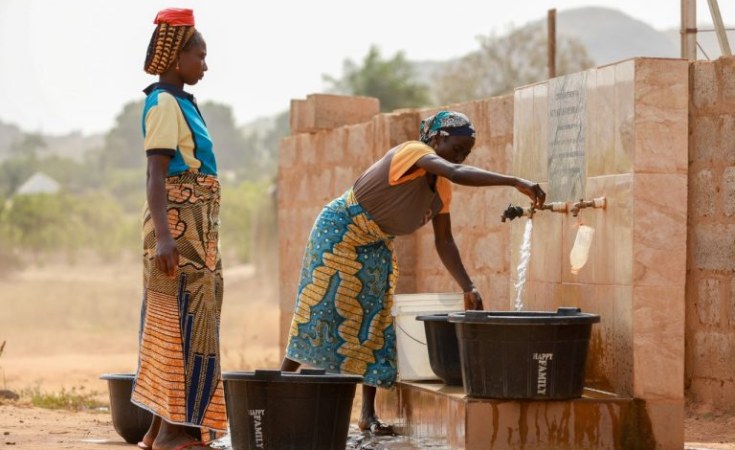As the saying goes, "Water is life". However, one could rephrase it to say-"Adequate and safe water is life", or better yet, borrow the famous line from Samuel Taylor Coleridge's poem titled 'The Rime of the Ancient Mariner': 'water, water everywhere and not a drop to drink' to describe the global Water, Sanitation, and Hygiene (WASH) situation. The availability of water everywhere does not imply its safety for drinking or other purposes.
The statistics on access to safe drinking water and sanitation are staggering. According to the World Health Organization (WHO), about 2 billion people globally lack access to "safely managed drinking water", and 3.6 billion people lack access to safely managed sanitation services. These figures reflect the challenges in providing access to water and sanitation in Nigeria, as well as the disparities between developed countries.
Nigeria has many rivers, so much so that some of its states -- Benue, Niger, Rivers, and Cross River -- were named after rivers. However, despite this endowment, the country grapples with a critical deficiency of clean water, particularly in rural areas, where inhabitants are disproportionately affected by an acute scarcity of fresh, potable water compared to their urban counterparts.
According to the 2021 WASH NORM report, nearly a quarter of Nigerians (23%) lack access to basic water supply services. The vast majority (87% or 179 million people) do not have access to safe drinking water services. In addition, just 10% of the population has access to water, sanitation, and hygiene services. The report also highlights that in seven states, less than half of the population has access to safe drinking water, and no state in the country has attained 100% coverage.
Children suffer significantly from poor access to adequate WASH services. UNICEF reports that poor access to improved water and sanitation in Nigeria contributes significantly to the high morbidity and mortality rates among children under the age of five, with up to 70,000 children under the age of five dying annually as a result of their vulnerability to water-borne illnesses. Women and girls also suffer disproportionately from the lack of adequate WASH services because they are often burdened with the responsibility of fetching water across very long distances.
Accelerating Change
The annual observance of World Water Day is on March 22nd a global initiative to heighten awareness of the crucial importance of water and the barriers to achieving equitable access to safe and dependable water sources. This year's theme -"Accelerating Change to Solve the Water and Sanitation Crisis," underscores the urgent need for collective action towards addressing the world's acute water and sanitation crisis.
To accelerate progress towards ensuring that all Nigerians have access to sustainable and safely managed WASH services by 2030, in 2018, the Nigerian government declared a state of emergency for the water, sanitation, and hygiene sector and launched the National Action Plan for the Revitalization of Nigeria's WASH Sector. With the support of the World Bank, Water Aid and other development partners, the federal government developed initiatives to address identified gaps that have limited access to safe and potable water in the country. In 2020, the World Bank approved the Nigeria Sustainable Urban and Rural Water Supply, Sanitation, and Hygiene Program (SURWASH), providing 6 million people with essential drinking water services and 1.4 million access to improved sanitation services.
To accelerate change and propel Nigeria towards achieving its objective of providing universal access to water, sanitation, and hygiene by 2030, the federal government and states must establish institutional and funding foundations for sustainable water, sanitation, and hygiene services. Here are some steps that they can take to achieve this:
- Allocating more funds towards the WASH sector will ensure that critical funding and financing are available to provide necessary infrastructure and services. Increasing budget allocation to the sector will also ensure sufficient funding to implement programmes and projects to improve access to WASH services.
- Effective governance provides the framework for implementing policies and strategies that improve the sector. Strengthening institutional frameworks will involve establishing clear roles and responsibilities for various stakeholders, improving coordination and collaboration among stakeholders, and enhancing transparency and accountability in the sector.
- The private sector is critical in financing, constructing, and managing WASH infrastructure. Adopting innovative financing mechanisms, such as public-private partnerships, can help mobilise additional resources for the WASH sector. Also, engaging the private sector in WASH service delivery and establishing a conducive environment for private sector participation will help to establish a practical institutional foundation.
- Rural communities in Nigeria face significant challenges in accessing WASH services therefore, the government should prioritise rural areas in WASH service delivery and ensure that interventions are tailored to their unique needs and circumstances.
- Behaviour change is critical in promoting improved hygiene practices and ensuring the sustainability of WASH interventions. The government should, therefore, invest in behaviour change campaigns that promote improved hygiene practices and sanitation behaviours.
Working together, doing it right
Finally, effective coordination is necessary within the WASH sector and other relevant sectors for the National Action Plan to succeed. As the WASH sector in Nigeria involves numerous state and non-state actors, coordination is vital for efficient financing and improved sector performance. Therefore, the government at federal and state levels must prioritise coordination and dialogue to integrate with sectors like public health, education, urban and rural development, environment, and governance for sustained impact.


